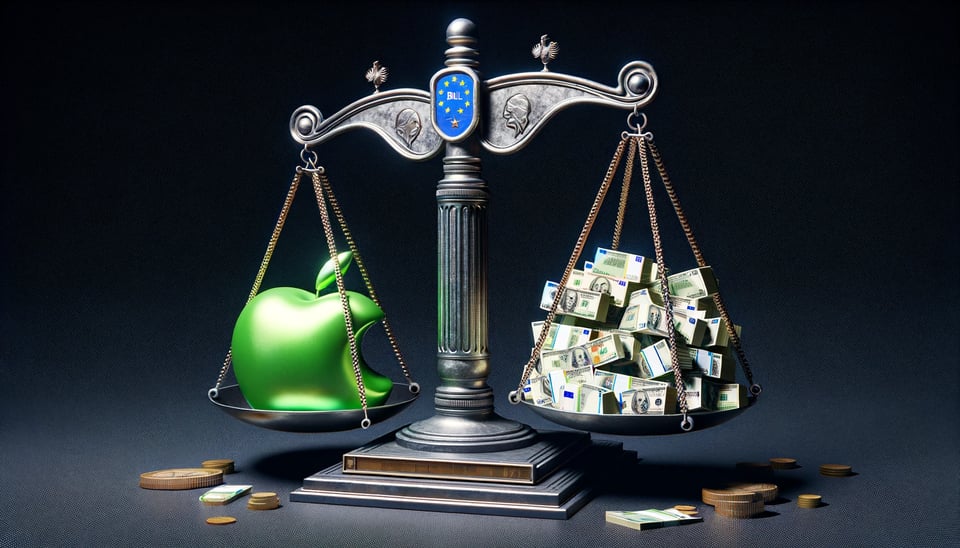
In a landmark decision, the European Union has fined Apple nearly $2 billion, citing unfair rules set by the tech giant for developers of music-streaming apps. This fine underscores a critical conversation about the balance between platform control and the autonomy of app developers, especially in choosing security solutions and payment methods.
At the heart of the EU's decision is the assertion that Apple's practices not only stifled competition, but also potentially led iOS users to pay more for music streaming subscriptions. In response to the European Union's Digital Markets Act (DMA), Apple plans to appeal, and asserts arguments that no credible evidence of consumer harm was found. Apple emphasizes its commitment to user security, privacy, and safety, acknowledging the challenges and changes required by the DMA. Apple outlines efforts to adapt while striving to maintain the highest standards of user protection. The company also introduced measures such as Notarization for iOS apps, ensuring applications, regardless of distribution method, are reviewed for security threats. Despite these efforts, Apple acknowledges the inherent risks of sideloading and alternative payment methods, expressing concern that these changes may introduce vulnerabilities.
Apple has long positioned itself as a steward of security within its ecosystem, claiming that its strict control over the App Store and in-app payments serves to protect users. However, this stance has increasingly come under scrutiny, particularly as developers express the desire for more freedom in selecting security and payment solutions that adhere to reputable mobile standards like those set by the OWASP Foundation, without being subject to "Apple taxes." Nevertheless, Apple commits to innovating and implementing safeguards to mitigate broader mobile ecosystem risks, aiming to uphold its values of security and privacy within the constraints of the DMA's requirements.
The crux of the matter lies in the balance between Apple's role in setting security standards and the rights of developers to choose independent, potentially more flexible and cost-effective security solutions. Independent security services, such as those provided by companies like Approov, can offer robust protection against a range of threats, aligning with external standards and allowing developers to bypass platform-imposed fees, like Apple’s controversial core technology fee (CTF) of 0.5 euros/download. This CTF fee applies to apps irregardless of whether or not they are "active users". Many app developers are open to paying a fee for security services, but basing it on Monthly Active Users (MAUs), or other fixed pricing models that are not bundled with the marketplace that is distributing the apps, nor commissions on the revenue they receive through the Apple payments portal.
The European Commission's fine and the broader implications of the Digital Markets Act signal a significant shift towards greater openness and competition in the tech industry. These developments mandate that Apple, among other tech giants, must allow for alternative app stores and payment processing services, empowering developers to direct customers to different subscription methods.
Criticism of Apple's proposed compliance plans with the new EU rules highlights a potential gap between the company's measures and the objectives of the Digital Markets Act. Developers and associations have voiced concerns that these plans, if unaltered, could undermine the law's intent, suggesting a need for a closer alignment with the spirit of fostering competition and innovation.
This situation underscores the importance of allowing developers the freedom to implement independent security solutions that meet or exceed recognized standards. Such flexibility not only enhances the security and privacy of apps, but also introduces new considerations for the broader tech ecosystem.
Apple's counterarguments to the DMA emphasize the company's longstanding commitment to these principles, expressing concerns that the DMA's requirements, particularly around sideloading and alternative payment systems, could compromise the very foundation of security and privacy Apple users expect. The company argues that while it is adapting to comply with the DMA, these changes pose significant challenges, potentially making devices more susceptible to malware, privacy breaches, and scams.
Balancing the European Union's desire for increased competition and consumer choice with Apple's focus on security and privacy presents a complex challenge. As the tech landscape continues to evolve, finding a middle ground that respects the intentions of regulations like the DMA (& US DoJ), while ensuring the security and privacy of users, remains paramount. The conversation between regulatory bodies and tech giants like Apple and Google is crucial in shaping digital marketplaces that are both open and safe.
This nuanced approach highlights the ongoing debate in the tech community: how to foster innovation and competition without compromising on the security, privacy and user experience that has become a hallmark of platforms like Apple's. As developers and consumers navigate these changes, the industry must continue to seek solutions that balance these sometimes competing priorities.